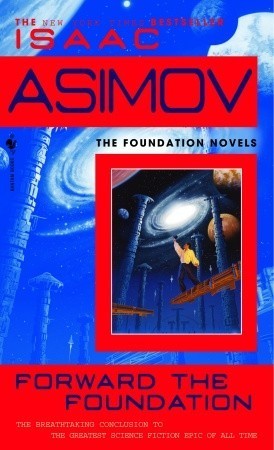
Forward the Foundation
Foundation Series, Book 2
کتاب های مرتبط
- اطلاعات
- نقد و بررسی
- دیدگاه کاربران
نقد و بررسی

March 1, 1993
The late Grand Master of science fiction brings his most famous work, the epic Foundation series, to a posthumous close in this volume. Returning to the format of earlier books in the saga, he presents the story in discrete, novella-length segments, finally grappling with the figure at the center of the entire series: the adult Hari Seldon, creator of psychohistory and father of the Foundation itself (the young Seldon was featured in the previous series novel, Prelude to Foundation ). Here, Seldon confronts various threats to the Empire or to the psychohistory project, thwarting them for the most part by his characteristic brand of informed intuition. In part I, Seldon recognizes the rise of a dangerous anti-Imperial movement led by the charismatic Jo-Jo Joranum, and defuses it while simultaneously backing into the post of First Minister. In the second segment (of five), Seldon narrowly avoids an attempt on his life but cannot prevent the assassination of the Emperor Cleon I. Seldon faces personal as well as political setbacks while civilization crumbles. This volume neatly sews up the series, though it offers few real surprises. Most interesting is the glimpse it affords of Asimov himself, obviously personified in Seldon. The psychohistorian's vast intellectual interest, his concern for the future of learning in a time of decline, and his frustration in the face of mortality, ring true with special poignance. Asimov's fans should savor this final taste of his unique persona.

March 2, 2009
Asimov began the seminal future history series dubbed "Foundation" in the late 1940s with Foundation, Foundation Empire, and Second Foundation (books three, four, and five, respectively) and came back to it in the 1980s (Foundation Edge, etc.), posthumously polishing it off with Forward in 1993. Though written last, Forward is placed second in the seven-book* series and centers on Hari Seldon (many think this character mirrors Asimov himself) who created psychohistory, "a mathematical way of analyzing human society that ends by predicting the future." After ruining a villainous, anti-Imperial plot on planet Trantor, the charismatic and, as they say in Boston, "wikked smaht" Seldon becomes First Minister to Emperor Cleon I. While Seldon escapes an assassination attempt, Cleon doesn't, which puts Seldon out of a job. Subsequently, Seldon continues working with psychohistory; his physical aging and the loss of his loved ones mirror the regression of universal civilization and foreshadows the fall of the Galactic Empire that Asimov chronicled in book one. Dialog frequently carries the plot and action, and characters sometimes seem a little stiff since the books are so concerned with societal change. An especially lucid writer, Asimov is classed in nine of the ten DDC ranges (he missed the 100s). He's called The Grand Master for a reason. Dude factor: Best. Sideburns. Ever. (See LJ's original review.)
Copyright 2009 Library Journal, LLC Used with permission.

























دیدگاه کاربران